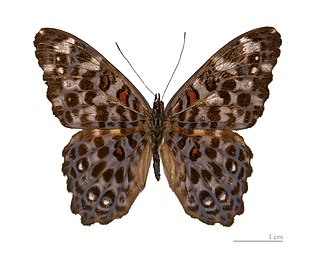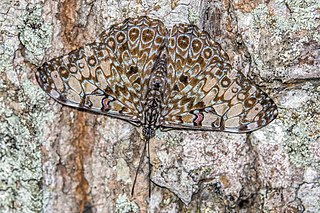
Cracker butterflies are a Neotropical group of medium-sized brush-footed butterfly species of the genus Hamadryas. They acquired their common name due to the unusual way that males produce a "cracking" sound as part of their territorial displays. The most comprehensive work about their ecology and behavior is that of Julian Monge Najera et al. (1998). The genus was erected by Jacob Hübner in 1806.

Hamadryas guatemalena, also known as the Guatemalan cracker or Guatemalan calico, is a species of butterfly in the family Nymphalidae. It is found from southern North America to central South America.
Cracker, crackers or The Crackers may refer to:

Hamadryas amphinome, the red cracker, is a species of cracker butterfly in the family Nymphalidae, native to regions of North and South America.

Hamadryas arinome, the turquoise cracker, is a species of cracker butterfly in the family Nymphalidae. The species was first described by Hippolyte Lucas in 1853. It is found from Mexico south to the Amazon basin.

Hamadryas chloe, the Chloe cracker, is a species of cracker butterfly in the family Nymphalidae. It is found in Suriname, Peru, Colombia, Bolivia, and Brazil.

Hamadryas laodamia, the starry night cracker or starry cracker, is a species of cracker butterfly in the family Nymphalidae. It can be found from Mexico to the Amazon basin, but is most common in lowland forest in the Caribbean area.

Hamadryas feronia, the blue cracker or variable cracker, is a species of cracker butterfly in the family Nymphalidae. It is found in the southern parts of North America and South America and southwards Brazil.

Anthanassa frisia, the Cuban crescentspot, Cuban checkerspot or Cuban crescent, is a butterfly of the family Nymphalidae. Subspecies tulcis is known by the common names pale-banded crescent or Tulcis crescent; it is treated as a species by some authors.

Eurema boisduvaliana, commonly known as Boisduval's yellow, is a butterfly in the family Pieridae. It is found from Costa Rica north to Mexico. Rare strays may be found in southern Florida, but it is a regular migrant to south-eastern Arizona, south-western New Mexico, and southern Texas. The habitat consists of subtropical forests and forest edges, scrubs, roadsides and pastures.

Ganyra josephina, the giant white, is a butterfly in the family Pieridae.

Strephonota tephraeus is a species of butterfly of the family Lycaenidae. It is found from Mexico to Venezuela, the Amazon, the Guianas and Peru. Rare strays can be found as far north as the lower Rio Grande Valley in Texas. The habitat consists of lowland tropical forests, particularly along rivers.

Heliopetes laviana, the Laviana white-skipper or Laviana skipper, is a butterfly in the family Hesperiidae. It is found from Argentina through Central America and northern Mexico to southern Texas. Strays can be found in southern Arizona and central and northern Texas. The habitat consists of edges of brushy areas, trails, roadsides, open woodland, thorn forest and streamsides.

Ministrymon clytie, the Clytie hairstreak, is a butterfly of the family Lycaenidae. It was described by William Henry Edwards in 1877. It is found from southern Arizona, New Mexico and Texas to Mexico, Guatemala and Costa Rica. The habitat consists of tropical forest openings and subtropical thorn forests.
Chlorostrymon telea, the telea hairstreak, is a butterfly of the family Lycaenidae. It was described by William Chapman Hewitsonin 1868. It is found from southern Texas and Mexico to Colombia, Uruguay, Paraguay, eastern Bolivia, Argentina and Chile. The habitat consists of stream valleys of semideciduous dry forests.

Hamadryas iphthime, the ringless blue cracker or brownish cracker, is a species of cracker butterfly in the family Nymphalidae. It was first described by Henry Walter Bates in 1864. It is found in Mexico, Central America and parts of northern South America.
Dalechampia triphylla is a vine in the family Euphorbiaceae. It is native to tropical South America.

Hamadryas glauconome, the pale cracker or glaucous cracker, is a species of cracker butterfly in the family Nymphalidae. It was described by Henry Walter Bates in 1864 and is found in Mexico, Central America and south to Peru. It has been recorded as an unexpected vagrant in the United States in southern Florida, Arizona and Texas.















